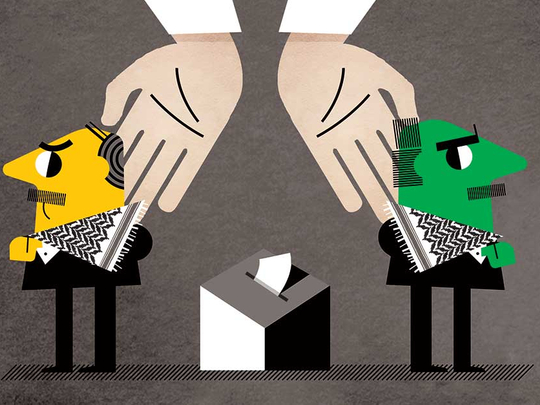
Palestine has slipped low on the official Arab agenda since the Arab Spring of 2011 and the events it unleashed. True, headlines in the region were briefly dominated by successive Israeli assaults on the Gaza Strip in 2012 and 2014, and to a lesser extent by the outbreak of the ‘knife intifada’ (knife uprising) in occupied East Jerusalem last year. But in terms of political engagement, Arab attention has been focused elsewhere for the past five-and-a-half years.
This has begun to change. After preliminary diplomacy, Arab states have reportedly launched a fresh Palestinian reconciliation initiative. The so-called Arab Quartet — consisting of Egypt, Jordan, Saudi Arabia and the UAE — seeks to mend fences between Palestinian National Authority (PNA) President Mahmoud Abbas and former Gaza Strip security chief Mohammad Dahlan, who has serious frictions with the Fatah movement that dominates the PNA and the Palestine Liberation Organisation. The idea is that healing this rift within Fatah will be a prelude to effecting a comprehensive national reconciliation involving all Palestinian political groups, notably Fatah and Hamas.
These moves followed the PNA’s decision in June to call municipal elections in both the West Bank and Gaza Strip on October 8, and Hamas’ announcement the following month that it would contest them.
Given the very limited powers and resources of municipal councils — under the stifling constraints of Israeli occupation in the West Bank and siege in the Gaza Strip — Palestinian opinion was divided over the significance of the impending polls. Some said they might be a way of offering alternative local administration to that provided by the PNA, which was never meant by the Oslo Accords to be more than an over-sized municipal council itself. Others were worried that the exercise could be used by Israel to try to revive a variant of the Village Leagues — the short-lived collaborationist local administrations it tried to set up in the West Bank in the 1970s.
However, many view the polls more as a public opinion survey, a way of gauging the relative popularity of the various Palestinian political forces in the Occupied Territories and the policies they advocate, on the basis of which, the various stakeholders will proceed towards rebuilding the PNA and other Palestinian institutions. Fatah, Hamas and other groups have therefore worked hard to promote their candidates or sympathisers and put together vote-winning electoral alliances and lists.
But the two big parties both fear that protest votes could cause them serious setbacks in their respective strongholds. Fatah is haunted by the spectre of a repeat of the unexpected Hamas landslide at the 2006 legislative elections. There have been serious suggestions that the movement could garner as little as 20 per cent of the overall vote in the West Bank as a result of public frustration with the PNA’s mismanagement and corruption and the failure of its negotiating strategy to lead to a Palestinian statehood. In 2006, this prompted even many Christians to back the Islamist Hamas’ candidates and the same could happen again. But Hamas is equally fearful of a backlash against it in Gaza this time, where its behaviour since it took control of the Strip in 2007 has alienated many.
Jitters in both parties
Accordingly, some observers are increasingly convinced that the polls could be deferred or called off altogether because of jitters on the part of both the big parties. Indeed, last Thursday, the High Court of Justice in the West Bank ordered the elections postponed, citing procedural problems in occupied East Jerusalem, where the Israelis will not allow voting to take place, and in Gaza. The previous day, a separate court in Gaza ruled to reject electoral lists put forward by Fatah, leaving it with no candidate in nine of the Strip’s 25 electoral districts.
Regardless of when or whether voting goes ahead, there is a significant pressure on Fatah to unify ranks. But Abbas has refused to go along fully with the endeavours.
The Arabs have good cause to be worried as Fatah is riven with sharp divisions and suffers from an ageing leadership and waning popularity. Hamas has also sought to broaden its appeal and make itself more acceptable to its western detractors by including many independent figures and professionals on its electoral lists.
Personal and political blow
Many surprises could be sprung in the weeks to come and it is hard to foretell the results of the polls. One can be sure, however, that it is President Abbas who has the most to lose. A poor Fatah performance will deal him a major personal and political blow at a testing time when he is subject to numerous internal and external pressures.
If and when they take place, the outcome of the municipal elections could be crucial in determining the future course of developments in the Occupied Territories. It could provide the basis for stabilising the political scene and resumption of the political process on a new footing. But it could also have the opposite effect: For Fatah will not brook defeat and Hamas will not brook being robbed of any victory as in 2006.
Abdel Bari Atwan is the editor-in-chief of digital newspaper Rai alYoum. You can follow him on Twitter at www.twitter.com/@abdelbariatwan.










